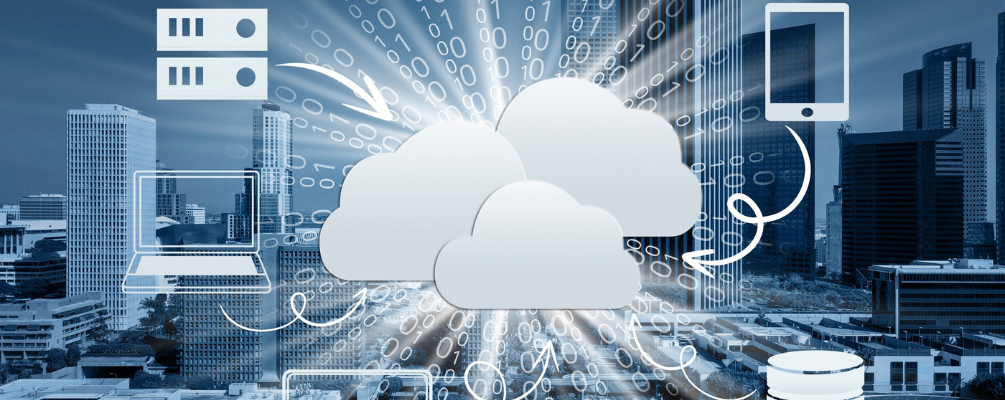> Articles > How Cloud Applications Affect the Future of Your Business

How Cloud Applications Affect the Future of Your Business
Today, CEOs are using technology to improve their daily operations, and cloud applications for business are playing an important role in this transformation. These apps help manage software, data, and business growth. As technology and customer data increase, businesses need new ways to handle customer experiences. Therefore, cloud computing offers flexibility to companies of all sizes to enhance their productivity and maintain a competitive edge.
What are Cloud Applications for Business?
Cloud applications or cloud apps are among the most groundbreaking concepts in modern business software usage and data management. They operate entirely in the cloud, eliminating the need for local installations. This cloud-based approach streamlines data management and processing, as information and logic are shared between the user’s device and the cloud server.
Cloud architecture enables applications to be accessed online, providing users with remote connectivity to data and programs. Compared to traditional software delivery models, this approach offers businesses enhanced flexibility, cost-effectiveness, and scalability. As Gartner reports, global end-user expenditure on public cloud services was $591.8 billion in 2023. These figures show the constant growth of cloud applications across industries.

The Benefits of Cloud Applications for Business
Cloud applications are advantageous for businesses as they help streamline business operations and reduce costs. Here are a few additional benefits of cloud apps:
Scalability and Flexibility
The main advantage of cloud applications is their scalability. Unlike the conventional IT infrastructure, cloud apps require a good amount of upfront investment and long-term planning. Cloud-based solutions allow businesses to adjust their computational power, storage, and other resources to meet real-time demand. The flexibility is advantageous for businesses experiencing rapid growth in workload. By scaling up or down as needed, businesses can avoid unnecessary expenses associated with hardware upgrades or lengthy procurement processes. Moreover, cloud applications provide greater adaptability to changes in workflows and customer preferences. This is achieved without the need for extensive reconfiguration, enabling businesses to respond quickly to evolving market conditions.
Cost-Effectiveness
Cloud apps can help reduce IT infrastructure costs. By transitioning to the cloud, businesses can eliminate the need for costly physical infrastructures like servers and data centers. Cloud service providers offer flexible pricing models that align with a company’s evolving needs. Additionally, cloud applications reduce the overhead of ongoing maintenance and updates, allowing businesses to focus on core operations. This enables companies to redirect their IT resources toward growth and innovation rather than software maintenance tasks.
Data Security and Compliance
Security remains a primary business concern, primarily due to escalating cyber threats. Traditional IT infrastructure often fails to offer security features, which is not the case with cloud applications. Data encryption, multi-factor authentication, and regular backups are the standard features offering protection to critical business data.
Cloud applications also offer built-in compliance management features that help businesses. Cloud service providers have tools to make compliance systems more manageable to ensure that the business follows HIPAA, GDPR, and other industry-specific regulations, especially for businesses that need to handle large volumes of sensitive data or operate in under-regulated industries.
Cloud service providers have dedicated cybersecurity teams and state-of-the-art defense systems that are difficult for smaller businesses to implement on their own. This helps ensure a greater level of protection that frees up the internal resources, focusing on the core business activities.

Disaster Recovery and Business Continuity
Cloud applications provide a highly reliable backup solution for businesses facing system failures, security breaches, and other unexpected events. Traditional IT infrastructures often need to ensure proper data backup, leaving organizations vulnerable to data loss. Cloud-based systems offer regular backups, secure storage, and efficient data recovery in emergencies.
Along with disaster recovery, cloud applications contribute to business continuity. Employees continue working with the critical data and applications stored in the cloud even when the physical offices are compromised. Accessing business applications and data from different locations ensures less downtime and allows businesses to maintain operations during unexpected disruptions.
Final Words
While many businesses, including startups, recognize the transformative potential of cloud computing, many are still in the early stages of adoption. Seeking the expertise of cloud application development service providers or consulting with cloud experts can be invaluable in navigating this journey and realizing the full benefits of cloud-based solutions.
Frequently Asked Questions
1. How do cloud applications improve business efficiency?
Cloud applications streamline business operations by offering real-time access to tools, resources, and data from anywhere. They help businesses scale rapidly while reducing possible downtime, eventually leading to better business decisions and efficient workflows.
2. Are cloud applications secure for businesses handling sensitive data?
Cloud service providers implement advanced security measures such as data encryption, regular backups, and multi-factor authentication. These features safeguard key information, ensure compliance with industry regulations, and reduce vulnerabilities to cyber threats.
3. How do cloud applications reduce IT costs for businesses?
Cloud applications remove the requirement for expensive hardware and physical servers. They use a pay-as-you-go model. The providers handle updates, maintenance, and security, allowing businesses to allocate resources to growth instead of IT maintenance.
Transform your business with SlickDigital’s innovative cloud application solutions. Contact us today.
Latest Posts
-
 10 Jun 2025 Company NewsPress Release: SlickDigital Joins Pivotly to Advance Custom App Development for AI-Driven Enterprises
10 Jun 2025 Company NewsPress Release: SlickDigital Joins Pivotly to Advance Custom App Development for AI-Driven Enterprises -
 21 Nov 2024 Data MigrationKey Data Migration Challenges and Effective Strategies to Overcome Them
21 Nov 2024 Data MigrationKey Data Migration Challenges and Effective Strategies to Overcome Them -
 21 Nov 2024 Blockchain DevelopmentHow to Choose the Right Blockchain Platform for Your Development Project?
21 Nov 2024 Blockchain DevelopmentHow to Choose the Right Blockchain Platform for Your Development Project? -
 21 Nov 2024 MVP DevelopmentHow to Validate Your Business Idea with MVP Development
21 Nov 2024 MVP DevelopmentHow to Validate Your Business Idea with MVP Development -
 19 Nov 2024 Staff AugmentationTop Benefits of IT Staff Augmentation for Growing Tech Teams
19 Nov 2024 Staff AugmentationTop Benefits of IT Staff Augmentation for Growing Tech Teams -
 19 Nov 2024 CloudHow Cloud Applications Affect the Future of Your Business
19 Nov 2024 CloudHow Cloud Applications Affect the Future of Your Business -
 18 Nov 2024 Application DevelopmentExplore the Best Tools for Effective Application Integration
18 Nov 2024 Application DevelopmentExplore the Best Tools for Effective Application Integration
